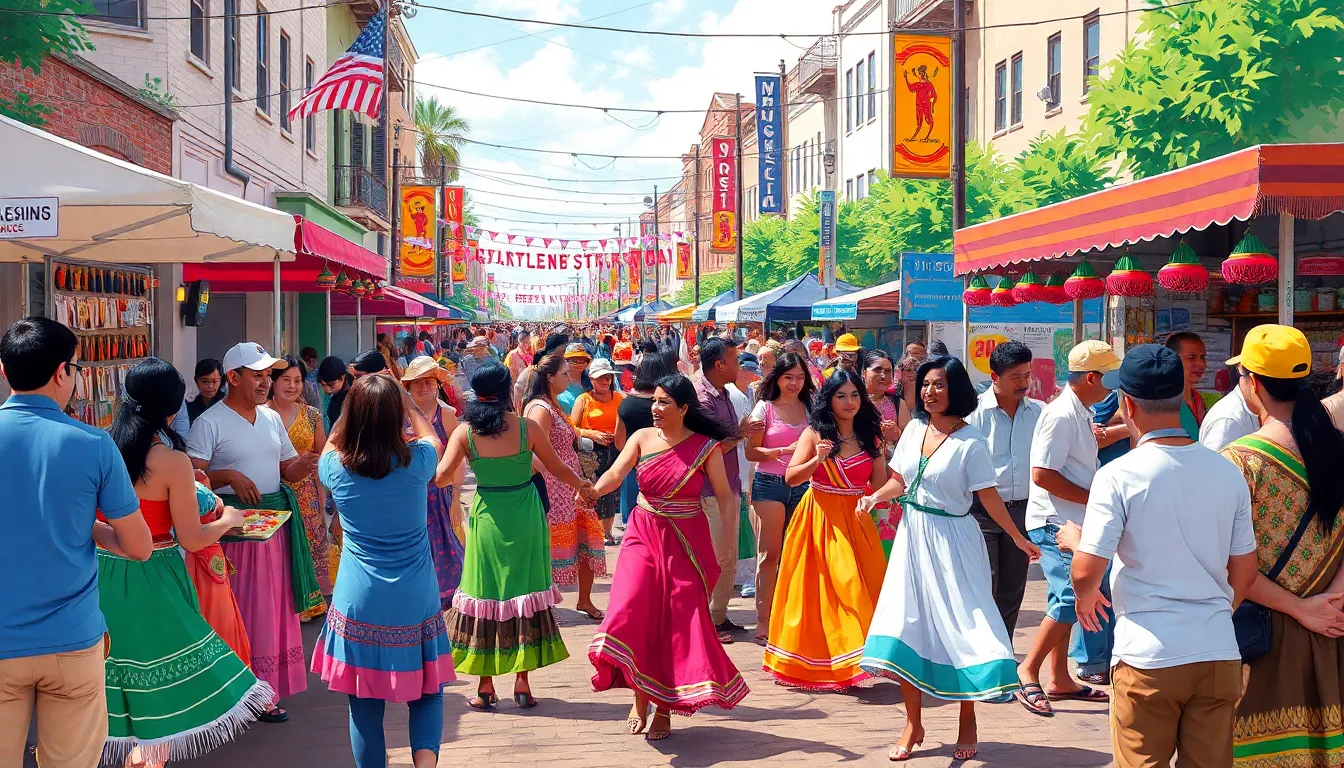Culture is the spice of life, and exploring its rich tapestry can be as thrilling as a rollercoaster ride through a museum. From vibrant festivals that light up the streets to art that makes you question your life choices, cultural highlights offer a feast for the senses. They tell stories of history, tradition, and creativity that resonate across generations.
Table of Contents
ToggleOverview of Cultural Highlights
Cultural highlights showcase the richness of human expression and experience. Festivals celebrate traditions while art reflects societal values and history. Cities around the world host unique events that draw locals and tourists alike, turning streets into vibrant stages.
Countries often highlight their heritage through music, dance, and culinary traditions. For instance, the Carnival in Rio de Janeiro features colorful parades and samba music, attracting millions. Similarly, the Diwali festival in India illuminates homes and hearts with lights and sweets, illustrating unity and joy.
Art galleries and museums offer profound insights into the past. They display artifacts that tell stories about different cultures, influencing perspectives. Each artwork encapsulates epochs, allowing viewers to connect with historical periods and events.
Cultural celebrations also foster community spirit. Local artisans display their crafts, providing a platform for cultural exchange. Visitors engage with traditions in authentic settings, enhancing understanding and appreciation.
Food often serves as a centerpiece of cultural identity. Street food markets feature diverse cuisines, each dish offering a taste of history and locality. Culinary festivals invite exploration of regional specialties, showcasing flavors and cooking techniques.
Incorporating music into cultural highlights deepens the emotional resonance. Live performances provide an immersive experience, creating memorable connections between artists and audiences. Each melody carries the weight of tradition, while contemporary expressions innovate and challenge norms.
Engagement with cultural highlights enriches societal narratives. They reflect evolving identities while preserving cherished traditions. Through festivals, art, food, and music, individuals explore the tapestry of human civilization, celebrating diversity and shared experiences.
Major Cultural Highlights in Different Regions

Cultural highlights reflect the diversity and richness of human experiences across various regions. Each area boasts unique events and traditions that captivate and inspire.
North America
Celebrations like Mardi Gras in New Orleans showcase vibrant parades and live music, attracting thousands. The Sundance Film Festival highlights independent cinema and creative storytelling. Indigenous cultures also feature prominently, with events like Powwows celebrating rich traditions and arts. Culinary experiences, such as food festivals celebrating regional dishes, reflect local flavors and history.
Europe
Europe’s cultural landscape flourishes through events like Oktoberfest in Munich, where beer and traditional Bavarian cuisine take center stage. Art fairs, such as the Venice Biennale, showcase groundbreaking works from around the globe. Festivals like La Tomatina in Spain offer unique ways to engage with local customs involving playful tomato-throwing. Historical reenactments also provide immersive experiences, connecting people with the continent’s rich heritage.
Asia
Asia thrives with cultural festivals like Diwali in India, symbolizing the victory of light over darkness through stunning displays of lights. The Lantern Festival in China features colorful lanterns and vibrant celebrations that bring communities together. Additionally, the annual Gion Matsuri in Japan showcases traditional parades filled with beautiful floats. Regional cuisines play a significant role, offering authentic flavors during culinary festivals and street markets.
Africa
Africa’s cultural highlights include the vibrant Carnival of Durban in South Africa, where music, dance, and art come alive. Festivals such as Timkat in Ethiopia celebrate religious traditions with colorful processions. Local artisan fairs provide platforms for crafts that reflect cultural heritage and creativity. The annual Fes Festival of World Sacred Music in Morocco highlights global harmony through performances that unite diverse cultures.
The Significance of Cultural Highlights
Cultural highlights play a crucial role in shaping identities and fostering communities. These events create opportunities for connection, education, and celebration.
Cultural Preservation
Cultural preservation is vital for maintaining traditions and history. Communities actively engage in safeguarding their unique practices, customs, and stories. Festivals, traditional crafts, and art forms ensure that future generations can appreciate and learn from their heritage. Efforts such as local performances and workshops provide hands-on experiences for visitors and residents alike. Institutions like museums and cultural centers also contribute significantly by showcasing artifacts and organizing exhibitions that celebrate cultural legacies.
Tourism Development
Tourism development often hinges on cultural highlights. Unique festivals and events attract visitors seeking authentic experiences. Successful destinations leverage their cultural heritage to enhance tourism, drawing in travelers interested in local artistry and festivities. Economic growth stems from these cultural attractions, as they encourage spending in hotels, restaurants, and shops. Communities, in turn, benefit as they foster pride in their cultural assets while creating opportunities for local artisans and performers to thrive.
Challenges Facing Cultural Highlights
Cultural highlights face numerous challenges that can threaten their existence and authenticity.
Globalization
Globalization increasingly affects local cultures, leading to the homogenization of traditions. Cultural events risk losing their unique characteristics as global influences permeate societies. Local artisans may struggle to compete with mass-produced goods that flood markets. Festivals sometimes adapt to meet tourist expectations, diluting their original significance. These changes can result in a disconnection from historical roots, leaving traditional practices vulnerable. It’s crucial for communities to actively advocate for the preservation of their unique cultural identities amid these shifts.
Environmental Factors
Environmental factors pose significant challenges to cultural highlights. Climate change impacts the frequency and intensity of natural disasters, threatening locations significant to cultural events. Locations like historic sites or festival venues can become less viable if extreme weather events damage them. Sustainability concerns also arise as the popularity of cultural tourism grows, leading to overcrowding and environmental degradation. Local communities increasingly work towards balancing cultural celebration with ecological preservation. Collaboration among stakeholders ensures that cultural traditions can thrive while maintaining the health of their environments.
Cultural highlights play a crucial role in connecting individuals to their heritage and fostering community bonds. They offer a vibrant tapestry of experiences that celebrate diversity and shared human narratives. As communities navigate the challenges of globalization and environmental changes, the preservation of unique traditions remains essential.
Engaging with cultural events not only enriches personal experiences but also supports local artisans and performers. By prioritizing cultural preservation, communities can ensure that their traditions continue to thrive, providing future generations with the opportunity to celebrate their rich histories and identities. Embracing these cultural highlights creates a more interconnected world where joy, creativity, and unity flourish.




